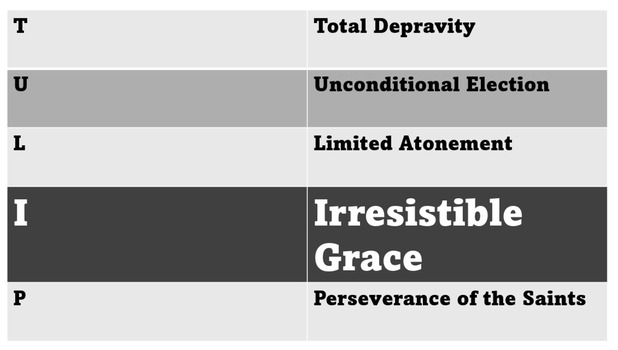Calvinism’s TULIP: Why Affirm Irresistible Grace?
Why Affirm Irresistible Grace? Welcome to the fourth post in our series on TULIP, the five points of Calvinism that form the backbone of Reformed theology. In this series, we’re hoping to make a compelling, biblical case for each of these five doctrines that are often considered difficult yet, are profoundly important. The acronym TULIP stands for:
- T: Total Depravity
- U: Unconditional Election
- L: Limited Atonement
- I: Irresistible Grace
- P: Perseverance of the Saints
Today, we’re focusing on the ‘I’ in TULIP: Irresistible Grace. This doctrine has often been misunderstood, leading to confusion and controversy. It is therefore necessary for thinking Christians to settle for ourselves this question: is there a compelling enough reason from Scripture that prompts us to affirm the doctrine? Why must we affirm this difficult doctrine? And why is it necessary to grapple with these challenging concepts in our times?
Understanding Irresistible Grace
Irresistible Grace, also known as Effectual Calling, teaches that God’s call to the elect is effectual; that is, it unfailingly brings about the intended response of faith and repentance. This doesn’t mean that God forces people against their will, but rather that He changes the heart so that the person willingly comes to Christ.
Why Affirm Irresistible Grace? Here’s Biblical Support
Let’s examine some key passages that support this doctrine:
- John 6:44 (ESV): “No one can come to me unless the Father who sent me draws him. And I will raise him up on the last day.” Jesus teaches that coming to Him is impossible without the Father’s drawing, and all who are drawn will be raised up (saved).
- Romans 8:30 (ESV): “And those whom he predestined he also called, and those whom he called he also justified, and those whom he justified he also glorified.” This verse shows an unbroken chain from predestination to glorification, with calling as an effective link in that chain.
- Acts 16:14 (ESV): “One who heard us was a woman named Lydia, from the city of Thyatira, a seller of purple goods, who was a worshiper of God. The Lord opened her heart to pay attention to what was said by Paul.” Here we see God actively opening Lydia’s heart to respond to the gospel.
- Ezekiel 36:26-27 (ESV): “And I will give you a new heart, and a new spirit I will put within you. And I will remove the heart of stone from your flesh and give you a heart of flesh. And I will put my Spirit within you, and cause you to walk in my statutes and be careful to obey my rules.” God promises to give a new heart and to cause obedience, illustrating the effectual nature of His grace.
Why Affirm Irresistible Grace?
- It Upholds God’s Sovereignty in Salvation: This doctrine ensures that God’s purpose in election is accomplished, not thwarted by human stubbornness..
- It Aligns with Total Depravity: If we are truly dead in our sins (Ephesians 2:1), we need more than just assistance; we need resurrection.
- It Gives Assurance: Believers can be confident that God’s work in their lives will be effective and complete.
- It Magnifies God’s Grace: It shows that our salvation is entirely of grace, not dependent on our own abilities or decisions.
- It Encourages Evangelism: Knowing that God’s call is effectual gives us confidence as we share the gospel, trusting in His power to save.
Addressing Common Misunderstandings
- Doesn’t this make people robots? No, God changes our desires so that we freely choose Him. It’s not coercion, but transformation.
- What about free will? Our will is only truly free when liberated from the bondage of sin by God’s grace.
- Doesn’t this contradict verses about resisting the Spirit? The general call of the gospel can be resisted, but the specific, effectual call to the elect cannot.
- Isn’t this unfair? All of us deserve judgment; that God saves any is pure grace (Romans 9:14-16).
Why Affirm Irresistible Grace Today?
In our current cultural climate that often emphasizes human autonomy and self-determination, Irresistible Grace reminds us of crucial biblical truths:
- Salvation is entirely of God, from beginning to end.
- Our response to God is itself a gift of grace.
- God’s purposes cannot be ultimately thwarted by human resistance.
Understanding and affirming this doctrine fosters humility, gratitude, and confidence in God’s saving work, countering the prevalent notion that salvation ultimately depends on human choice or effort.
Conclusion: Irresistible Grace, while challenging to our human understanding, is a biblical doctrine that magnifies God’s power and grace in salvation. It assures us of the effectiveness of His calling and motivates us to share the gospel, knowing that God’s word will not return void (Isaiah 55:11).
As we grapple with this truth, may we be filled with wonder and praise, echoing the words of Paul in Ephesians 1:3-6 (ESV):
“Blessed be the God and Father of our Lord Jesus Christ, who has blessed us in Christ with every spiritual blessing in the heavenly places, even as he chose us in him before the foundation of the world, that we should be holy and blameless before him. In love he predestined us for adoption to himself as sons through Jesus Christ, according to the purpose of his will, to the praise of his glorious grace, with which he has blessed us in the Beloved.”
This doctrine leads us not to passivity, but to active gratitude and praise for God’s amazing grace that effectively calls us from darkness into His marvellous light (1 Peter 2:9).
Why Affirm Irresistible Grace? Related FAQs
- Why does the doctrine of Irresistible Grace continue to be controversial? Irresistible Grace is controversial because it challenges the common belief in human free will by asserting that God’s grace effectively ensures the salvation of the elect. Many find it difficult to reconcile the idea of an all-powerful, sovereign God who irresistibly draws people to Himself with the notion of personal autonomy and choice.
- What does Irresistible Grace mean? Irresistible Grace, also known as Effectual Calling, means that God’s grace will unfailingly bring about faith and repentance in the hearts of the elect. This does not mean God forces people against their will but rather that He changes their desires, enabling them to willingly respond to His call.
- Why do we affirm Irresistible Grace? We affirm Irresistible Grace because it upholds the biblical truth that God is sovereign in salvation. Scriptures like John 6:44 and Romans 8:30 demonstrate that God’s calling is effective and cannot fail. It ensures that those whom God chooses will indeed come to faith, preserving the harmony of His redemptive plan.
- Does Irresistible Grace make people robots? No, Irresistible Grace does not make people robots. It transforms hearts and minds so that individuals freely and willingly choose to follow Christ. The change is internal, making the person genuinely desire God, rather than being coerced against their will.
- How does Irresistible Grace relate to free will? Irresistible Grace teaches that true freedom is found when God liberates us from the bondage of sin. Prior to God’s intervention, our wills are enslaved to sin. Grace makes us truly free by enabling us to willingly embrace God’s salvation.
- Why is Irresistible Grace important to evangelism? Irresistible Grace provides confidence in evangelism, assuring us that God’s call is effective. As we share the gospel, we trust that God will irresistibly draw those He has chosen, ensuring that our efforts will bear fruit according to His sovereign will.
- Is Irresistible Grace fair? The fairness of Irresistible Grace lies in God’s mercy, not in human merit. Since all deserve judgment, that God chooses to save some demonstrates His grace. Romans 9:14-16 reminds us that God’s mercy is His to give and is not owed to anyone.
Related Posts
Editor's Pick

Prevenient Grace: 5 Reasons the Doctrine Fails
Can a spiritually dead person choose God? It’s one of the oldest questions in Christian theology. And how we answer [...]

Why Do People Hate the Doctrine of Election?
…WHEN THEY REALLY SHOULDN’T Few Bible doctrines provoke stronger reactions than election. The idea that God chose some for salvation [...]

The Doctrine of Providence: Does God Really Govern All Things?
You’re sitting in the doctor’s office when the diagnosis lands like a thunderclap. Your mind races: Why this? Why now? [...]
SUPPORT US:
Feel the Holy Spirit's gentle nudge to partner with us?
Donate Online:
Account Name: TRUTHS TO DIE FOR FOUNDATION
Account Number: 10243565459
Bank IFSC: IDFB0043391
Bank Name: IDFC FIRST BANK






